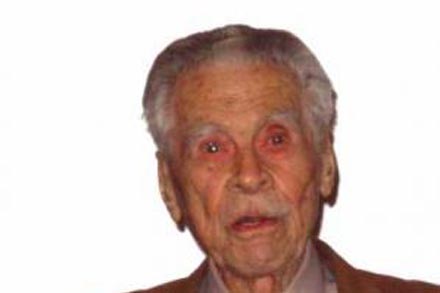
If the mindset of Dr. Alexander Imich is any indication, embracing death may be one of the keys to longevity in this realm of existence. Imich, who celebrated his 107th birthday on Feb. 4, says that living a long life has never been one of his goals and that he has no fear of death. “I am very interested in finding out how things are on the ‘other side,’” he wrote in an e-mail to me recently.
“My goal in life has always been illumination,” he told me when I interviewed him in 2003 on the occasion of his 100th birthday. Nothing has changed in that respect. As he did seven years ago, Imich, who lives in a Manhattan apartment, starts his average day with physical exercises and meditation, followed by reading and answering e-mail. “After lunch, more work with the computer, reading periodicals and books, and, at times, receiving guests,” he added.
A native of Poland, Imich received his Ph.D. in zoology from the University of Krakow. He came to the United States with his wife Vela shortly after World War II, initially living in Bucks County, Pennsylvania. After Vela transitioned in 1986, Imich moved to New York City.
Much of Imich’s life has been devoted to investigating the paranormal and attempting to convince mainstream science that there is more to reality than meets the eye. “According to major religions, man has body and soul,” Imich said. “Mainstream science cannot accept this division. However, parapsychology has already offered evidence that death is only a transition to another reality.”
Imich’s interest in psychical research and parapsychology began during the 1920s. In his 1995 book, Incredible Tales of the Paranormal, he relates some of the best evidence, including his own investigation of the Polish medium referred to as Matylda S. He tells of rings vanishing from the fingers of one person and turning up on another, spirits materializing out of nowhere, large objects (apports) appearing in front of him in thin air. “I will never forget the kiss of a phantom,” he offered. “An invisible face, whose breath I could distinctly hear and feel on my face, kissed mine. It was a strong and pleasant sensation.”
As a scientist, Imich approached his investigations with proper skepticism, but came away from his many sittings with Matylda convinced that there was no fraud or chicanery involved. Over the past 80 years, he has observed much more in the way of psychic phenomena. In recent years he has studied the physical mediums Joseph Nuzum and Dr. Safwat El Amin. He observed Nuzum levitate and move through the air in his (Imich’s) hotel room, and has observed many apports with El Amin, including one in which thousands of dollars in cash appeared in a big box near Imich’s laser printer but then disappeared within a few seconds. He also witnessed spirit photography in which his deceased wife appeared next to him in a photograph.
But Imich says that “communications from and appearances of deceased people” have been the major phenomena leading to his conviction that consciousness survives death.
Born in Czestochowa, Poland, the third son of a corporate bank president and founder of a Jewish hospital, young “Alech” was educated at home until the age of 10 by a governess and several tutors. Although his town was under German occupation during WWI, Imich was able to continue his education. However, when the Russian attacked Poland in 1918, Imich, then 15, joined the army and became a truck driver. After the Bolsheviks were repelled, he returned to school. His Ph.D. thesis was on the digestive systems of microscopic worms.
Employed as a chemist before WWII, Imich, who speaks Polish, English, French, and German, was commissioned by the Russians to head up a soap-making factory during the war. When the Russians insisted that he become a Russian citizen, Imich refused. He and Vela were then put on a cattle train and sent to a prison camp near the White Sea. “There were about 600 people – all Jews,” Imich said, recalling an incident in which the camp commander put a gun to his head and clicked it while demanding information about his fellow prisoners. When Imich told him that he did not speak Yiddish and therefore did not have the information, the commander sent him back to his barracks. He spent a year-and-a-half in the prison camp. Upon returning to Poland at the end of the war, he found that most of his relatives and friends had been murdered in concentration camps.
Imich is frustrated at the reluctance of mainstream science to accept the evidence for the afterlife. As he sees it, the religious superstitions of the medieval age continue to
influence the scientific community while there is little funding for research.
“Parapsychology is almost at a standstill,” he says. “To end this unfortunate situation a public demonstration a la Pasteur with famous Nobel prize-winning scientists and a full participation of the media has to be organized. The verdict of such an illustrious jury, plus the voice of the public will open purses of governments. Research in parapsychology will speed up intellectual and spiritual progress of humankind.”
Meanwhile, Imich plans to remain active with his own research. He does not know if his life’s goal of enlightenment or illumination is related to longevity, but assumes that keeping the mind challenged has contributed to it. “Maintaining a strong interest in something does seem to have a positive effect on health,” he offers, “but how does one measure that? My advice to the young person looking for a long life is to select the proper diet, don’t smoke, don’t drink alcohol, sleep six to seven hours, exercise, try to live in places with less polluted atmosphere, and select a proper life’s companion.”
As an afterthought, he quipped, “And select the right parents.”
|